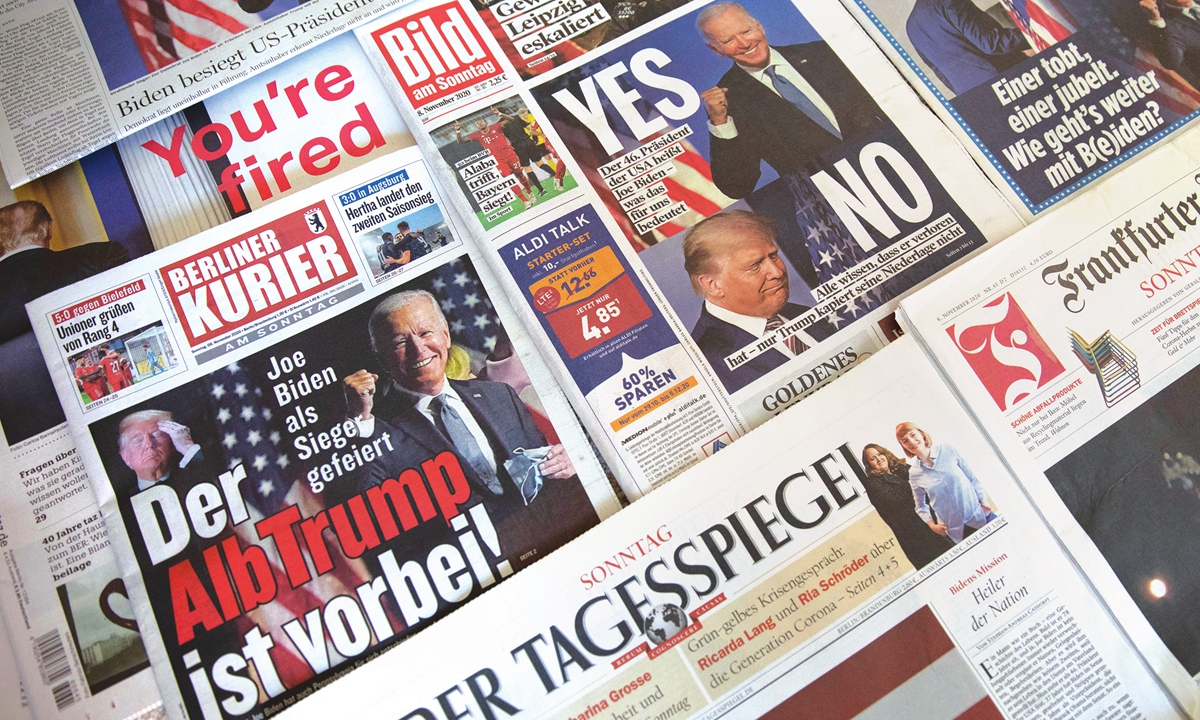Biden can’t ignore cooperation with China
By Ma Jingjing and Li Xuanmin Source: Global Times Published: 2020/11/10 20:13:40
Reasonable, predictable politician will cut uncertainties: experts

Headlines in German newspapers in Berlin show a tale of winners and losers as they report Joe Biden's victory in the US presidential race over outgoing US President Donald Trump on Sunday. German government leaders have reacted with relief and congratulations following the projected win of Biden. Photo: VCG
While Democrat Joe Biden, declared victory for the US presidential election over the weekend, may unite the country's allies in setting rules for global trade and continue to confront China after he assumes the presidency, he can't neglect cooperation with the world's second-largest economy, experts say.
Whether Biden's foreign economic policies are more or less disruptive than Donald Trump's, China will not be anxious to negotiate with the US government to remove the high tariffs imposed by Trump on more than $200 billion worth of Chinese goods, as China is shifting to a new development pattern centered on "dual circulation" that will primarily rely on domestic market supply and demand, they noted.
In the past four years, the reckless Trump administration upended a rules-based global trading order, as the US withdrew from the Trans-Pacific Partnership (TPP), threatened to dismantle the WTO, imposed higher tariffs on steel, aluminum and other products, and launched a massive trade war with China.
"Unlike businessman Trump, Biden as a veteran politician is more reasonable and predictable," He Weiwen, a former senior trade official and an executive council member of the China Society for World Trade Organization Studies, told the Global Times on Tuesday.
Judging from the Democratic Party's attitude to globalization, Chinese experts said that Biden will support multilateralism and play a more active role in rules-making in global organizations. In the meantime, Biden may push forward the functioning of the dispute settlement mechanism of the WTO and pursue renegotiating the TPP.
In article "Why America Must Lead Again" published in Foreign Affairs in April, Biden hinted at his foreign economic policy after winning the presidency. In order to win the competition for the future, the US must sharpen its innovative edge and unite the economic might of democratic countries around the world to counter "abusive economic practices" and "reduce inequality," he wrote.
Gao Lingyun, an expert at the Chinese Academy of Social Sciences in Beijing, predicted that the US will make some concessions to repair ties with its traditional allies such as Japan and Europe. Based on a stable relationship with Japan, it is highly likely that the US will seek to expand its influence in Asia later.
"But relations won't return to those of the era of Barack Obama in a short time," Gao predicted.
Meanwhile, room for China-US cooperation will be much broader after Biden takes office, as he respects international rules and could reduce the risks and uncertainties hanging over bilateral relations to a certain extent, experts noted.
As a rival to Trump, Biden frequently criticized Trump's enthusiasm for wielding the tariff club. In an interview with US media outlet NPR in August, he said that Trump's tariffs have made US manufacturing go into a recession and its agriculture has lost billions of dollars.
He said that Biden will surely lift the tariffs Trump imposed on Chinese goods but he would maintain the phase-1 trade deal intact because Biden would expect China to expand imports of US goods following the swift recovery of the Chinese economy from the impact of the coronavirus pandemic.
During the just-ended annual China International Import Expo held in Shanghai, Guangdong Province-based Foran Energy Group signed an agreement with US producer Cheniere Energy Inc to purchase 26 cargoes of liquefied natural gas over the next few years, reflecting American companies' reliance on the huge Chinese market.
China-US relations will be cooperative yet competitive, Gao said, noting that there will likely be a change in tone in China-US bilateral relations during Biden's presidency.
He said that the US may strengthen cooperation with China in climate change, specifically in new energy development. "In this sense, there will be a window for cooperation between China and US technology companies, rather than a complete ban on advanced Chinese companies," He said.
However, Washington is most likely to continue its containment of China's technological development. "The US does need to get tough with China… There is no reason we should be falling behind China or anyone else, when it comes to clean energy, quantum computing, artificial intelligence, 5G, high-speed rail, or the race to end cancer as we know it," Biden wrote in the article.
Experts said that however the external environment changes, China will stick to its "dual circulation" strategy, under which local technological innovation will drive China's manufacturing industry and push it up the global value chain while strategically ensuring domestic market supplies.
Posted in: ECONOMY